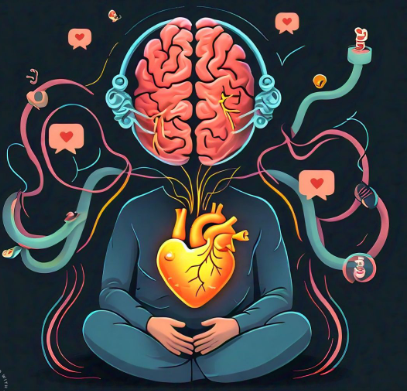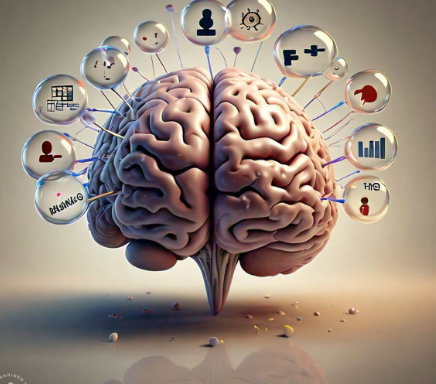
Love profoundly impacts mental health, influencing emotional well-being and resilience. Positive relationships release oxytocin, dopamine, and endorphins, reducing stress, anxiety, and depression. Unconditional love boosts self-worth, confidence, and emotional regulation. Conversely, toxic relationships can lead to trauma, attachment disorders, and low self-esteem. Healthy love fosters emotional growth, coping skills, and mental resilience, promoting overall well-being and happiness. Love’s impact on mental health is complex and multifaceted, affecting emotional and psychological well-being.
The Positive Impact of Love on Mental Health
Love, in its various forms, has profound effects on our mental well-being. Positive experiences of love can transform our lives, fostering emotional resilience, happiness, and overall mental health.
I. Emotional Well-being

Love’s impact on emotional well-being is profound. When we experience love, our brain releases neurotransmitters like dopamine, serotonin, and oxytocin, often referred to as “feel-good” hormones. These chemicals enhance our mood, reducing stress and anxiety. A loving relationship provides a sense of belonging, validation, and support, boosting our self-esteem and confidence. This emotional safety net allows us to navigate life’s challenges with greater ease.
Research has shown that individuals in loving relationships tend to experience:
- Improved mood regulation
- Increased happiness
- Enhanced emotional intelligence
- Better coping mechanisms
Love’s emotional benefits extend beyond romantic relationships. Strong familial bonds, friendships, and community ties also contribute to our overall emotional well-being.
II. Stress Reduction

Love plays a significant role in stress reduction. Social support from loved ones helps mitigate anxiety and tension. Physical touch, such as hugs and cuddling, releases oxytocin, calming our nervous system. Even small gestures, like supportive texts or phone calls, can alleviate stress.
Chronic stress can have devastating effects on mental health. Love’s stress-reducing benefits include:
- Lower cortisol levels
- Improved sleep quality
- Enhanced resilience
- Reduced risk of burnout
By cultivating loving relationships, we can develop healthier coping mechanisms and better manage stress.
III. Self-Esteem

Love profoundly impacts our self-perception. Positive affirmations from loved ones boost our confidence, self-worth, and identity. When we feel seen, heard, and valued, our self-esteem flourishes.
Love’s self-esteem benefits include:
- Increased confidence
- Improved body image
- Enhanced self-acceptance
- Greater self-compassion
Healthy self-esteem serves as a foundation for mental well-being, empowering us to navigate life’s challenges with resilience and confidence.
IV. Resilience
Love fosters resilience, enabling us to bounce back from adversity. Supportive relationships provide emotional safety, helping us navigate traumatic experiences. Love’s resilience benefits include:
- Improved coping skills
- Enhanced adaptability
- Increased motivation
- Better stress management
Resilience is crucial for maintaining good mental health. By cultivating loving relationships, we develop the strength to face life’s challenges.
V. Neurochemical Benefits
Love’s neurochemical benefits are well-documented. Oxytocin, dopamine, and serotonin releases associated with love contribute to:
- Feel-good sensations
- Mood regulation
- Emotional bonding
- Relaxation response
These neurochemicals play a vital role in maintaining mental health. By experiencing love, we stimulate the production of these essential chemicals.
In conclusion, love’s positive impact on mental health is undeniable. By cultivating loving relationships, practicing self-love, and prioritizing emotional well-being, we can foster resilience, happiness, and overall mental wellness.
The Challenging Impact of Love on Mental Health

While love can bring immense joy and benefits, it also has its challenging aspects. Understanding these complexities can help us navigate difficult emotions and maintain healthy relationships.
I. Heartbreak and Loss
Heartbreak can have devastating effects on mental health. The emotional pain and distress following a breakup or loss can lead to:
- Intense grief and sadness
- Depression and anxiety
- Sleep disturbances and appetite changes
- Social withdrawal and isolation
Research shows that heartbreak activates similar neural pathways as physical pain. The brain’s response to attachment loss can be intense, making it difficult to cope.
II. Unhealthy Attachments
Unhealthy attachments can lead to emotional turmoil. Codependency, obsessive behaviors, and toxic relationships can cause:
- Emotional dysregulation
- Loss of identity and autonomy
- Anxiety and stress
- Potential for mental health disorders
Recognizing signs of unhealthy attachment is crucial. These include excessive clinginess, control, and sacrifice of personal needs.
III. Relationship Stress
Relationship stress can significantly impact mental health. Conflict, communication issues, and emotional labor can lead to:
- Chronic anxiety and tension
- Emotional exhaustion
- Decreased self-esteem
- Potential for burnout
Effective communication and conflict resolution skills are essential for maintaining healthy relationships.
IV. Unrequited Love
Unrequited love can cause emotional pain and frustration. Longing and yearning can lead to:
- Depression and anxiety
- Low self-esteem and self-worth
- Social withdrawal and isolation
- Potential for mental health disorders
It’s essential to acknowledge and validate these emotions while maintaining a healthy perspective.
V. Trauma and Abuse
Trauma and abuse in relationships can have severe, long-term effects on mental health. Emotional scars and PTSD can develop from:
- Physical or emotional abuse
- Gaslighting and manipulation
- Neglect and abandonment
Seeking support from professionals, loved ones, and support groups is crucial for healing.
Conclusion
Love’s challenging impacts on mental health are real and significant. Acknowledging these complexities can help us navigate difficult emotions, prioritize self-care, and cultivate healthy relationships.
The Importance of Healthy Love for Mental Well-being
Healthy love plays a vital role in maintaining mental well-being. Nurturing positive relationships and self-love can transform our lives, fostering emotional resilience, happiness, and overall mental health.

I. Boundary Setting
Establishing healthy boundaries is crucial in relationships. By maintaining individuality and emotional safety, we:
- Protect our mental health
- Prevent codependency and burnout
- Foster healthy communication
- Encourage mutual respect
Setting boundaries involves:
- Identifying personal needs and limits
- Communicating assertively
- Prioritizing self-care
- Respecting others’ boundaries
II. Self-Love

Practicing self-love is essential for mental well-being. By cultivating self-acceptance, self-compassion, and self-care, we:
- Develop emotional resilience
- Enhance self-esteem
- Improve mental health
- Foster positive relationships
Self-love involves:
- Self-awareness and acceptance
- Self-care routines (exercise, meditation, hobbies)
- Positive affirmations
- Embracing imperfections
III. Supportive Relationships

Surrounding ourselves with supportive relationships is vital. Positive social connections:
- Enhance mental health
- Reduce stress and anxiety
- Increase feelings of belonging
- Foster emotional resilience
Nurturing supportive relationships involves:
- Cultivating empathy and understanding
- Practicing active listening
- Setting healthy boundaries
- Encouraging open communication
IV. Healthy Communication
Effective communication is key to healthy relationships. By practicing:
- Active listening
- Emotional expression
- Empathy and understanding
- Conflict resolution
We can:
- Prevent misunderstandings
- Foster intimacy and trust
- Resolve conflicts
- Maintain emotional safety
V. Emotional Intelligence
Developing emotional intelligence (EQ) helps navigate relationships and emotions. EQ involves:
- Self-awareness
- Emotional regulation
- Empathy
- Effective communication
By cultivating EQ, we:
- Enhance mental health
- Improve relationships
- Increase emotional resilience
- Foster positive relationships
Conclusion
Healthy love, self-love, and positive relationships are essential for mental well-being. By prioritizing boundary setting, self-love, supportive relationships, healthy communication, and emotional intelligence, we can cultivate resilient mental health and fulfilling relationships.



Pingback: Top 5 Causes of Congestive Heart Failure - HealthitudePlus